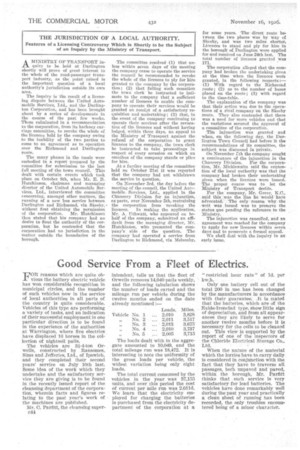Good Service From a Fleet of Electrics.
Page 66

If you've noticed an error in this article please click here to report it so we can fix it.
FOR_reasons which are quite obvious the battery electric vehicle has won considerable recognition in municipal circles, and the number of such vehicles now in the service of local authorities in all parts of the country is quite considerable. Vehicles of this type are performing a variety of tasks, and an indication of their successful employment in one particular direction is to be found in the experience of the authorities at Warrington, where five electries have displaced 10 horses in the collection of nightsoil pails.
The vehicles are 3i4-ton Orwells, constructed by Itansomes, Sims and Jefferies, Ltd., of Ipswich, and they completed their second years' service on July 10th last. Some idea of the work which they undertake and the satisfactory service they are giving is to be found in the recently issued report of the cleansing department of the corporation., wherein facts and figures relating to the past year's wort of the machines are published.
Mr. C. Parfitt, the cleansing super044 intendant, tells us that the fleet of Orwells removes 14,040 pails weekly, and the following tabulation shows the number of loads carted and the mileage run per vehicle during the twelve months ended on the date already mentioned :— Loads. Miles.
Vehicle No. 1 2,010 3,828
No. 2 2,011 3,517
No. 3 2,013 3,675
No. 4 2,010 3,737 „ No. 5 2,005 3,715 The loads dealt with in the aggregate amounted to 10,049, and the total mileage run was 18,472. It is interesting to note the uniformity of the gross loads per vehicle, the widest variation being only eight loads.
The total current consumed by the vehicles in the year was 37,155 units, and over this period the cost of current per mile run was 2.01.1d. We learn that the electricity employed for charging the batteries is purchased from the electricity department of the corporation at a
"restricted hour rate" of 1d. per Only one battery cell Qut of the total 200 in use has been changed by the manufacturers in accordance with their guarantee. It is stated that the batteries, which are of the Exide-Ironclad type, show little sign of depreciation, and from all appearances they are likely to serve for another twelve months before it is necessary for the cells to be cleaned out. This view is supported by the report of one of the inspectors of the Chloride Electrical Storage Co., Ltd.
When the nature of the material which the lorries have to carry daily is considered in conjunction with the fact that they have to traverse all passages, both unpaved and paved, within the borough, Mr. Parfitt thinks that such service is very satisfactory for lead batteries. The vehicles have done remarkably well during the past year and practically a clean sheet of running has been recorded, the only troubles encountered being of a minor character.












































































































